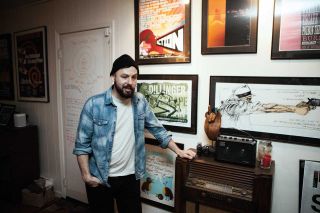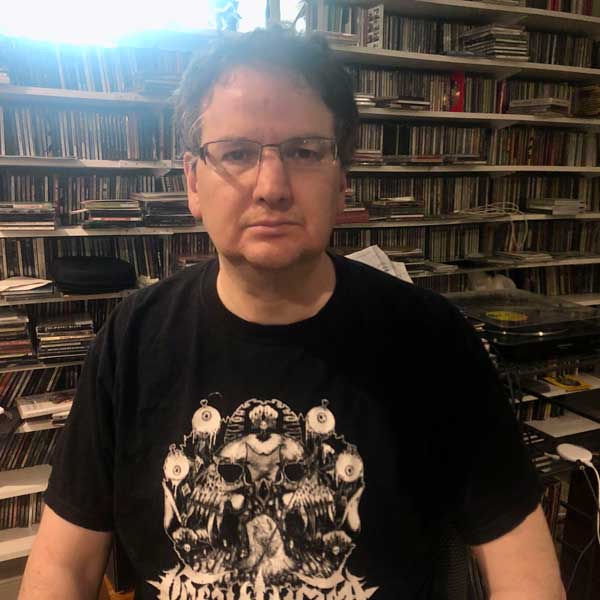Anyone who has seen The Dillinger Escape Plan guitarist Ben Weinman hurtling across the stage, attacking his guitar and amps and playing angry, angular riffs at tempos that sound more like meth-metal than math-metal might not take the guy for an astute businessman. Conversely, back in 1997, when the guitarist was enrolled in business school and working as a designer and programmer at internet tech company Logical Design Solutions, his co-workers had no idea he was in a free- wheeling rock band.
“It was a bit like Fight Club,” Ben says, nestled into one side of a beige couch in his colonial- style home in suburban New Jersey. “I would come to work with a tie and a black eye. People would say, ‘What happened?’ and I’d go, ‘Oh, I hurt myself playing soccer.’ No one knew I was going out at night and playing CBGB in New York and these squats and crust punk places in Philadelphia.”
Today, Ben is a successful musician (The Dillinger Escape Plan are currently recording their sixth full-length album) and an entrepreneur. When he’s not managing the band, consulting for other musicians or dipping into the waters of artist management, he’s busy building his new cross-platform, multimedia project, Party Smasher Inc. Currently, the company consists of a website featuring video interviews with creative people (more on that later), merch, a label and a technology research and development component. But Ben has even more ambitious goals for his company. “We want to help create a community of likeminded creative people that will work under the Party Smasher umbrella to present innovative ideas and build their careers through music and art,” he reveals.
I’d come to work with a tie and a black eye
As Ben speaks in a low, even timbre, his two adopted five-year-old boxer-mix mutts snuggle up on either side of him, jockeying for attention, which he happily delivers with multiple neck scratches and tummy rubs. Neither slick salesman nor wild-eyed misanthrope, Ben – casually dressed in a black t-shirt, jeans, a knit ski hat and dark socks – still believes in liberation through free expression. He’s not politically minded, nor does he want to battle social injustice. He just knows how important it is for those who question the norm to have their own culture outside of the grasp of the mainstream and he wants to help nurture that. Having grown up with heroes like Dead Kennedys vocalist and Alternative Tentacles label founder Jello Biafra, and Minor Threat/Fugazi singer and Dischord Records owner Ian MacKaye, Ben understands how music movements are capable of promoting identity and developing a collective and powerful voice for their community.

“Here’s a question for you,” posits Ben. “Why don’t the scenes from back in the day exist online in the same way as they did in the physical world? You can look back at the DC hardcore scene or the San Francisco thrash scene. Those were really important things that moulded people’s lives and gave them new ways to think. When I realised that kind of thing was sorely missing today, I felt like I needed to do something with Party Smasher to have some influence on the scene that we came from and to help build up that culture.”
While they have lofty aims, Party Smasher Inc. is currently still in the development stages. Their budget is minimal and at this point the company is mostly represented by its website, www.partysmasherinc.com, which features Ben interviewing artists, including Napalm Death’s Shane Embury, Mike Patton, Rolo Tomassi, Converge’s Kurt Ballou and Baroness frontman and painter John Baizley. The site also features contributions by various musicians, producers and technology specialists.
“It’s a place to put up articles by my friends who are doing things differently and saying, ‘This is how we did it,’” Ben says. “It’s not necessarily a do-it-yourself thing, it’s more like decide-it-yourself. One thing I really want to do is inspire people to do whatever they’re doing for the right reasons.”
Ben pauses and points to a diagram on the wall of his home office. It’s surrounded by framed Dillinger concert posters, but this particular image depicts three connected circles, each larger than the next.
“That’s a marketing diagram called The Golden Circle,” the guitarist explains. “Businesses like Apple use this to figure out how companies can work on a bigger, cultural level and it really speaks to me. The idea is when you know why you do what you do and you figure out how to do it, then what you do doesn’t matter as long as people believe in why you’re doing it.”

He pauses a moment to make sure his words have sunk in, then elaborates. “When people believe you’re truthful about what you’re doing, they will follow you. For me with The Dillinger Escape Plan, it was sometimes running into the crowd, kicking somebody in the face and then them coming back with stitches asking me to sign their hospital bracelet. They never took offence to being hurt. They were happy to be a part of something that was true, honest free expression.”
The Dillinger Escape Plan first used the Party Smasher Inc. logo in 2010 on their album, Option Paralysis, an option granted to them by French label Season Of Mist, who had signed the band for a single album deal and gave them complete creative control. 2013’s One Of Us Is The Killer, which The Dillinger Escape Plan licensed to various labels in different territories, also featured the logo, and illustrated Ben’s business acumen.
“We took the offers with the biggest cheques, basically, with the condition that they wouldn’t fuck with us,” Ben says. “‘One of my heroes is [Faith No More vocalist and Ipecac Records owner Mike Patton. “When we did the EP with him [2002’s Irony Is A Dead Scene], he said, ‘The only reason to sign to a record label is for a cheque. Otherwise, fuck ’em.’ That’s why he started Ipecac. And now we’re doing Party Smasher ourselves, so we will see what happens.”
The Party Smasher Inc. site went live in 2014, partially since Ben felt it was time to start building the company’s brand. But he was also motivated to see how a self-contained website would fare alongside countless corporate-sponsored entertainment sites that favour clickbait over credibility. “I heard that Honda was spending $50million on a music-oriented multi-channel thing called Honda Stage that was going to promote tours and stream concerts,” Ben says, his face crinkling with disgust. “I said, ‘They’re spending $50million! Fuck that! I’m gonna get a domain name, and me and my friends are going to spend about $500 to make this site, and it will be my experiment to see what the difference is between something real and something that’s been paid for.’”
Why don’t the scenes from back in the day exist online?
With a low overhead, there was no downside to Ben’s experiment. He had no marketing budget, and he and his unpaid friends provided all of the content. “A month after the Honda site went up I got Party Smasher up,” he says. “We just Tweeted the word out to people to check out the site, and the first day we had 100,000 views. Within the first two weeks there were five Party Smasher Inc. tattoos on Instagram from people I don’t even know and we had double the views of the Honda thing. That told me we were really on to something.”
Ben realised he needed to brush up on his business skills in 1997 after Dillinger signed a traditional but far from lucrative deal with Relapse for their first three albums. He read music business management and law books in order to understand deal memos and terms, and gradually his instincts took over, which allowed The Dillinger Escape Plan to travel in style when most of their peers were schlepping around in a van.
“We figured out that if a tourbus is sitting in a lot and nobody’s renting it, you can negotiate because they need that thing out of there,” he says. “They’re still paying a mortgage on it. We’d haggle with them and get a tourbus for the price of a van, a trailer and hotel rooms.”
One of Ben’s closest friends and best business partners is artist and engineer Thomas Bouaziz. Ten years ago, Thomas forced his way backstage at a Dillinger concert in Paris and soon became an integral part of the organisation. “He came up to me with a briefcase and a laptop and said, ‘Let me show you these things I made and these sensors that trigger different algorithms,’ Ben recalls. “The security guy was about to throw him out, but I said, ‘Wait. This sounds cool. I like this guy.’”
Ben flew Thomas to New Jersey and the two went to a home improvement store and bought lights and hardware, before ordering LED panels and additional electronic equipment online for their project. They built the light panels into guitar cabinets the band had broken or lit aflame in concert, and then Thomas programmed the components so they would come to life onstage, all at the cost of around $10,000.
“If we touched something, it would trigger an algorithm just like he said, and we didn’t even know which one it would pick,” Ben marvels. “It was like it was jamming with us while we played. Other bands asked, ‘How do you have this giant light show? Are you some massive, rich rock band?’ It’s funny, because in reality we were poor as fuck back then. We spent everything on this light show and we were just scraping by.”
Impressed by Ben’s creativity and ability to get things done, other bands, managers and label executives called The Dillinger Escape Plan guitarist for advice on how to survive in a post-internet music world. “We never made any money from selling records when we were on Relapse, so to suddenly be in a position where nobody was selling records anymore didn’t really affect us,” Ben says. “We had always relied on making money other ways. All of a sudden all of these people are coming up to us going, ‘Look, we don’t know how to do this. Obviously you do. What should we do?’ Guys in full Armani suits would come up to me and say, ‘I need to get a bus. I hear you’re the guy.’”
Like most businessmen, Ben has experienced his share of failures along with successes. In 2008, he launched a website called Garmutt.com that sold gag clothing for dogs. The jewel of the line was the ‘Petallica: Master Of Puppies’ shirt. Other items included garments that promoted Linkin Bark, Defbones, Black Labbath and Def Shepherd. Not long after the press began plugging Ben’s latest venture, Metallica’s management hit him with a cease and desist order.

“The same day I got the letter, I was getting ready to go to a Metallica concert,” remembers Ben. “I go backstage and Lars says, ‘Hey, Ben. What’s up? So what’s this about a shirt?’ He fucking knew! That dude knows everything. It blew my mind. The motherfucker just played a stadium. He’s in a robe about to get in his jet. And I’m just like, This is fucking crazy, man. You’re getting in your jet. Just lemme sell my dog shirt!’ Legally, I was 100% in the right. There’s a parody law that grants creative license to do stuff like that. But ultimately I didn’t have the resources, the time or the money to fight it so I just moved on.”
Fast-forward eight years. Party Smasher Inc. is getting ready to release its first album, The Future Of Death, from New York hardcore crew Primitive Weapons, and in the coming months the company will put out Dillinger’s next record as well as the debut by supergroup Giraffe Tongue Orchestra, which features Ben, Mastodon guitarist Brent Hinds, Alice in Chains vocalist William DuVall, ex-Mars Volta drummer Thomas Pridgen and Queens Of The Stone Age drummer Jon Theodore. So far, the band have written 20 songs and are scrambling to figure out which to use for the as-yet untitled album – if any.
You’re getting in your jet. Just lemme sell my dog shirt!
“It’s been really hard to get this done – one of the hardest things in my life,” Ben admits. “The lesson? Don’t do supergroups. It’s very difficult to have that many personalities in a band when everyone is busy doing other things. Having said that, me and Brent have always had a good chemistry and a good working relationship and we’ve jammed a lot together and come up with a bunch of stuff. It sounds like every one of us, for sure, but I don’t think it sounds like any one of our bands. I think the most interesting thing about it is you’ll get to hear William singing when he’s not doing the Alice In Chains thing.”
As Ben gets ready to leave his house to track new material with The Dillinger Escape Plan’s longtime producer Steve Evetts, he wants to summarise the purpose and intent of Party Smasher Inc. He explains how he would like to build the company to the point where he could hire all his friends and they’d never have to work a day job again, but he insists that could only happen if everyone worked with him not to make money, but to build something groundbreaking to benefit everyone that would use it. Finally, he thinks of an appropriate analogy. “It’s like you’re making children and you’re putting them out into the world,” he concludes. “If you make them for the right reasons, they’ll do great things. If you don’t, they’re gonna fucking do drugs and kill people.”
From Zero To Hero
Ben reveals the DIY pioneers who have inspired his creative ventures
IAN MACKAYE
“Minor Threat and Fugazi vocalist Ian MacKaye’s whole thing was about really nurturing a local scene and signing bands from that scene that were influenced by the same kind of things that were important to him. He did it with a strict set of rules he felt good about, and he was very successful.”
MIKE PATTON
“He has been a good friend and a mentor, has never compromised artistically and has always made interesting business choices. He’s in a massive arena band, Faith No More, and he still went and did bands like Mr. Bungle and started Fantômas. He has always done whatever he wants. Any artist should be influenced from that.”
JOHN MALONEY
“John started a company called Urban Baby, which was a community of parents. His 15-year-old intern was this kid named David Karp, who made amazing features for this website. John sold the company, and David started making this blog for himself and his friends. John said, “I’m gonna do the business, you create this thing.” It ended up being Tumblr. He’s my main advisor at Party Smasher.”
JELLO BIAFRA
“He’s a friend, too, and he’s always been cool. To this day, that guy will come to a show and just buy vinyl. He doesn’t care if he’s heard the band, he’s so committed to supporting local music and paying for it. He still makes relevant music and has something to say. And he’s still stagediving.”
PEARL JAM
“At the peak of their popularity they said, ‘We don’t want to be a part of this machine.’ They started this fan club that’s, like, $20 a year. Anyone in it gets access to [the best] tickets. A couple of years ago I heard there were 700,000 people in that club, so they’re making $14million before they even play a show.”
FOR MORE, VISIT PARTYSMASHERINC.COM. THE DILLINGER ESCAPE PLAN WILL RELEASE A NEW RECORD LATER THIS YEAR


